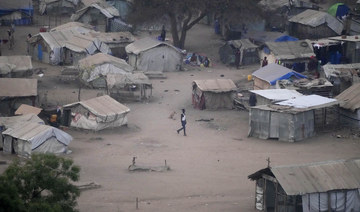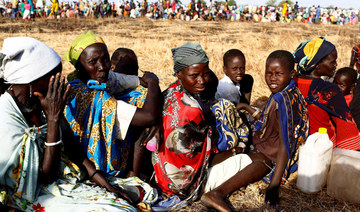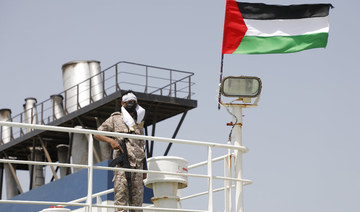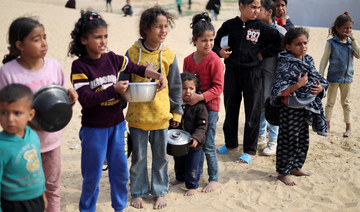NEW YORK CITY: The UN on Wednesday warned that a record 18 million people in Sudan, more than a third of the country’s population, are facing acute food insecurity.
The rapid slide into this “catastrophic” state of affairs is driven by a relentless civil war that has been raging between rival military factions for 11 months across the country. It has caused severe damage to livelihoods and food infrastructure, disrupted flow of trade, caused prices to rise sharply, placed constraints on humanitarian access, and caused the largest displacement crisis in the world, affecting more than 8 million people, the UN said.
“Sudan is one of the worst humanitarian disasters in recent memory” and is on course to become “the world’s worst hunger crisis,” said Edem Wosornu, director of operations and advocacy at the UN’s Office for the Coordination of Humanitarian Affairs.
She was briefing a meeting of the Security Council called by council members Guyana and Switzerland, along with Sierra Leone and Slovenia, to discuss food insecurity in Sudan.
It followed a so-called “white note” alert sent by OCHA to council members highlighting the quickly deteriorating situation. It warned that the populations most affected by food insecurity are concentrated in areas of most-active conflict, including Al-Jazirah, Darfur, Khartoum and Kordofan.
Maurizio Martina, the deputy director-general of the Food and Agriculture Organization, told council members the spread of the conflict to Al-Jazirah state in particular poses a “significant threat to national food production.”
This region is considered Sudan’s “breadbasket” because it produces about 50 percent of the nation’s wheat and 10 percent of its sorghum, which are essential crops. It is also the location of the Gezira Scheme, the country’s most important irrigation project and one of the largest of its kind in the world.
Experts warn that women, children and internally displaced people are at greatest risk from the food crisis in Sudan. The OCHA said projections suggest 730,000 children, including 240,000 in
Darfur, will suffer the most severe form of childhood malnutrition if the situation does not improve.
As well as describing to the Security Council the ways in which the civil war is driving the food crisis, Wosornu also highlighted accounts of sexual violence and ethnically motivated attacks in conflict hot spots.
“It is truly the stuff of nightmares,” she said. “There are reports of mass graves, gang rapes, shockingly indiscriminate attacks in densely populated areas and many more horrors.”
In Khartoum, Darfur and Kordofan, which are home to about 90 percent of the people facing emergency-level acute food insecurity, Wosornu said there had been “no respite from the fierce fighting for 340 days.”
This has resulted in “extensive damage, looting and widespread destruction of critical infrastructure, including food and nutrition manufacturing facilities, once the pride of Sudan,” she added.
“Farmers have been forced to abandon their farmlands. National cereal production has dropped by almost half since last year. And the supply of animal-sourced food, such as milk, has plummeted, contributing to spiraling levels of malnutrition.
“Meanwhile the conflict has driven up prices of basic food commodities by a staggering 83 percent compared to the pre-crisis period.”
Wosornu warned that by the time the lean season arrives in May, people in some parts of Darfur could be facing “catastrophic” levels of acute food insecurity.
“Malnutrition is soaring to alarming levels and is already claiming children’s (lives),” she said. “One child is dying every two hours in Zamzam camp in El-Fasher, North Darfur.”
Humanitarian officials estimate that in the weeks and months ahead, somewhere in the region of 222,000 children could die from malnutrition. With 70 percent of health facilities not functional, children who are malnourished are at greater risk of dying from preventable diseases.
“It seems utterly unfathomable that this tragedy could be allowed to happen. It keeps us all up at night and will do so for a long time,” said Wosornu.
She lamented the continuing lack of access for humanitarian workers to the most vulnerable parts of the country, despite a recent Security Council resolution calling warring sides in Sudan to allow the unhindered flow of aid.
On Feb. 21, the Sudanese government announced the suspension of cross-border aid deliveries from eastern Chad through the Adre border crossing, which has limited the UN’s humanitarian operations in Darfur.
On March 5, the government announced it would facilitate the delivery of aid supplies via other routes: from Chad using the Tine border crossing; from South Sudan through the Renk border crossing; and by allowing aircraft carrying aid to access airports in the cities of Al-Fasher, Kadugli and Al-Obeid.
While she welcomed these provisions, Wosornu said they were “far from enough in the face of looming famine,” and called for more entry points to be provided “as soon as possible and kept open for as long as they are needed; one-off arrangements are not sufficient.”
She also emphasized the need for immediate approval of deliveries of aid from Port Sudan that cross the battle lines of the conflict.
“We have not been able to cross conflict lines into parts of Khartoum since October 2023 due to insecurity and lack of timely approvals,” Wosornu said.
She also called on all involved in the war to protect humanitarian workers and the supplies they deliver. Since the outbreak of hostilities, 20 aid workers have been killed and 33 injured. About 150 warehouses and offices used by humanitarian operations have been looted.
In December in Al-Jazirah State, for example, an armed group looted a warehouse containing food supplies in an area controlled by the Rapid Support Forces, one of the factions locked in conflict. Wosornu said the attack affected supplies that could have fed 1.5 million acutely food-insecure people for a month.
Meanwhile, of the $2.7 billion needed to fund aid efforts in Sudan this year, only $131 million, less than 5 percent, has so far been received.
“A humanitarian travesty is playing out in Sudan under a veil of international inattention and inaction,” Wosornu told the council. “Simply put, we are failing the people of Sudan.”
She once again called on the international community to ensure all of those involved in the conflict “respect their obligations under international humanitarian law, including the prohibition of the use of starvation as a method of warfare, and the protection of vital goods, infrastructure and services needed for food systems and production, (and that they facilitate) cross-line and cross-border humanitarian access.”
She also called for the scaling up of funding for humanitarian operations, and of efforts to reach an immediate ceasefire and peaceful resolution to the conflict.
“These recommendations are only as good as the action taken on them,” Wosornu said.
“As we approach the one-year anniversary of the conflict, we cannot make clearer the desperation that civilians are facing in Sudan. We cannot explain in greater terms the catastrophic situation. And we cannot underscore more the need for Council action.”
Linda Thomas-Greenfield, the US permanent representative to the UN, said members of both the Sudanese Armed Forces and the Rapid Support Forces, the opposing forces in the conflict, have committed war crimes.
She urged “regional powers to immediately end the provision of weapons to the parties in Sudan,” reminding them that “there is a binding UN arms embargo in place in Darfur.”
She also underscored “the prohibition on starvation of civilians as a method of warfare” and said that if the SAF does not reverse its decision to limit cross-border access as a matter of urgency, “the Security Council must take swift action to ensure life-saving aid is delivered and distributed, and consider all tools at its disposal, including authorizing a cross-border mechanism.”
Sudan heading toward world’s worst hunger crisis, UN Security Council warned
https://arab.news/6sxfa
Sudan heading toward world’s worst hunger crisis, UN Security Council warned
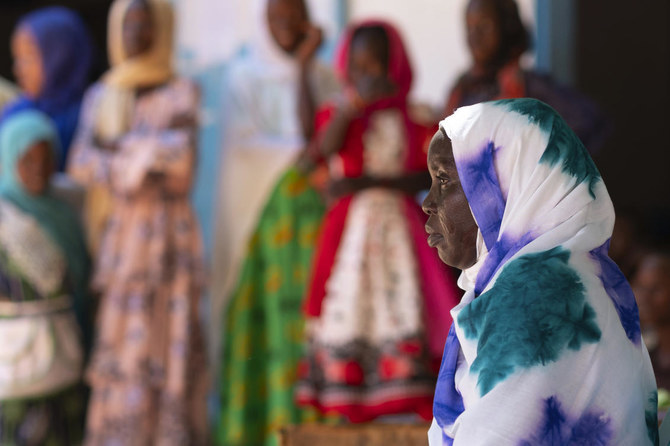
- 18 million people face acute food insecurity in the midst of a civil war that has been raging for 11 months
- Experts describe the humanitarian crisis in the country as a ‘travesty’ and the ‘stuff of nightmares’
Iran to hold presidential election on June 28: state media

TEHRAN: Iran announced Monday it will hold presidential elections on June 28, state media reported, following the death of President Ebrahim Raisi and his entourage in a helicopter crash.
“The election calendar was approved at the meeting of the heads of the judiciary, government, and parliament,” state television said.
“According to the initial agreement of the Guardian Council, it was decided that the 14th presidential election will be held on June 28.”
US says Houthis fired ballistic missile over Gulf of Aden

- “This continued malign and reckless behavior by the Iranian-backed Houthis threatens regional stability and endangers the lives of mariners,” CENTCOM said
- The Houthis did not claim credit for any fresh assaults on Monday, but they regularly do days later
AL-MUKALLA: Yemen’s Houthi militia launched a ballistic missile over the Gulf of Aden on Sunday, the US military said.
This comes as the Houthis intensified attacks on Yemeni government soldiers around the country.
The US military said in a statement on Monday morning Yemen time that at about 9:35 p.m. (Sanaa time) on Sunday, the Houthis launched one anti-ship ballistic missile from Yemen over the Gulf of Aden, but neither the US-led coalition nor international commercial ships reported being hit by the missile.
“This continued malign and reckless behavior by the Iranian-backed Houthis threatens regional stability and endangers the lives of mariners across the Red Sea and Gulf of Aden,” CENTCOM said.
The Houthis did not claim credit for any fresh assaults on Monday, but they regularly do days later.
The Houthis’ newest missile launch is part of an escalation of missile and drone strikes against commercial and navy ships in international seas near Yemen as well as in the Indian Ocean, which the Houthis claim are in support of Palestine.
The Houthis attacked dozens of ships with hundreds of ballistic missiles, drones and drone boats during their campaign against ships, which started in November.
They also took control of one commercial ship and destroyed another.
The US military said on Saturday that a Greek-owned and operated oil tanker heading toward China in the Red Sea, flying the flag of Panama, barely avoided being struck by a ballistic missile launched by the Houthis.
Meanwhile, four Yemeni government troops were killed on Monday while battling the Houthis in the province of Taiz, bringing the total number of soldiers killed in Houthi attacks to 11 in less than a week.
Local media said that the government’s Nation’s Shield Forces engaged in heavy fighting with the Houthis in the Hayfan area, on the border between Taiz and Lahj provinces, that left four of its soldiers dead.
On Saturday, a soldier from the same Yemeni military unit was killed and another injured while defending their position in Haydan against a Houthi onslaught.
Six more Yemeni soldiers from the government’s Giants Brigades were killed on Saturday in fighting with the Houthis in the Al-Abadia region of Marib’s central province.
On Monday, the Houthis held a military burial procession in Sanaa for two of their troops killed while battling with Yemeni government forces.
The Houthis have organized similar funerals for hundreds of fighters who have died on the front lines ever since the UN-brokered ceasefire came into effect in April 2022.
At the same time, official media said that Yemen’s Defense Minister Lt. Gen. Mohsen Al-Daeri met the UN Yemen envoy’s military adviser, General Antony Hayward, in Aden on Sunday to discuss Houthi attacks on government troops across the country, peace efforts to end the war, and the smuggling of Iranian weapons to the Houthis.
Al-Daeri said that the Houthis had breached agreements with the Yemeni government and would continue to pose a danger to international maritime lines as long as they controlled Yemeni territory on the Red Sea.
He also accused Iran of continuing to supply weapons and military officers to the Houthis through direct journeys from Iran’s Bandar Abbas port to the Houthi-controlled Hodeidah port.
On Monday, UN experts, including Nazila Ghanea, special rapporteur on freedom of religion or belief, urged the Houthis to release five members of the Bahai religious minority and to stop persecuting religious minorities in regions they control.
“We urge the de facto authorities to release these five individuals immediately and refrain from any further action that may jeopardize their physical and psychological integrity,” the experts said.
Armed Houthis abducted 17 Bahais, including five women, after bursting into a meeting in Sanaa a year ago, and they have refused to release them despite local and international requests.
According to the UN experts, the Houthis released 12 Bahais under “very strict conditions” after signing a written pledge not to communicate with other sect members, avoid religious activities and not leave cities without permission, and that the Houthis continue to hold five who are at risk of mistreatment by their captors.
“We are concerned that they continue to be at serious risk of torture and other human rights violations, including acts tantamount to enforced disappearance,” the UN experts said.
Egypt mourns death of Iran’s president

- The Egyptian president expressed Egypt’s solidarity with the leadership and people of Iran during this tragic time
CAIRO: Egypt mourned the deaths of Iran’s President Ebrahim Raisi and Foreign Minister Hossein Amir-Abdollahian.
Egypt’s presidency said in a statement: “It is with deep grief and sorrow that the Arab Republic of Egypt mourns the death of the President of the Islamic Republic of Iran, Ebrahim Raisi, Iran’s Minister of Foreign Affairs Hossein Amir-Abdollahian and their escorts on Sunday in a tragic crash.
“President Abdel Fattah El-Sisi extends his sincere condolences to the people of Iran, asking Allah to envelop President Raisi and the deceased with his mercy and grant solace and comfort to their families.”
The Egyptian president expressed Egypt’s solidarity with the leadership and people of Iran during this tragic time.
Meanwhile, Egypt’s Minister of Foreign Affairs Sameh Shoukry extended his condolences to the Iranian government and people over the deaths of Raisi and Amir-Abdollahian, according to ministry spokesperson Ahmed Abu Zeid.
A helicopter carrying Raisi, Amir-Abdollahian, and several other officials crashed in mountainous terrain in the country’s northwest on Sunday. On Monday, Tehran announced the deaths of Raisi, Amir-Abdollahian, and their accompanying delegation in the crash.
Israel calls ICC prosecutor’s bid for PM arrest warrant a ‘historical disgrace’

- Katz denounced the move as a “scandalous decision” that amounted to “a frontal attack... on the victims of October 7“
- The minister added that Israel would establish a special committee to fight the ICC prosecutor’s efforts to secure a warrant
JERUSALEM: Israel on Monday slammed as a “historical disgrace” an application by the prosecutor of the International Criminal Court for an arrest warrant for Prime Minister Benjamin Netanyahu.
The prosecutor, Karim Khan, applied for arrest warrants against Netanyahu and Defense Minister Yoav Gallant as well as top Hamas leaders on suspicion of war crimes and crimes against humanity.
Foreign Minister Israel Katz said that Khan “in the same breath mentions the Prime Minister and the Minister of Defense of the State of Israel alongside the abominable Nazi monsters of Hamas — a historical disgrace that will be remembered forever.”
The prosecutor said he was seeking warrants against Netanyahu and Gallant for crimes including “wilful killing,” “extermination and/or murder” and “starvation.”
Katz denounced the move as a “scandalous decision” that amounted to “a frontal attack... on the victims of October 7” when Hamas launched their attack on Israel, sparking the Gaza war.
The minister added that Israel would establish a special committee to fight the ICC prosecutor’s efforts to secure a warrant, and also embark on a diplomatic push against it.
Katz said he planned to “speak with foreign ministers in leading countries of the world so that they oppose the prosecutor’s decision and announce that, even if orders are issued, they do not intend to enforce them on the leaders of the State of Israel.”
35,562 Palestinians killed in Gaza offensive since Oct. 7 — health ministry

- 106 Palestinians were killed and 176 injured in the past 24 hours
DUBAI: More than 35,562 Palestinians have been killed and 79,652 injured in the Israeli military offensive on Gaza since Oct. 7, the Gaza health ministry said in a statement on Monday.
One hundred and six Palestinians were killed and 176 injured in the past 24 hours, the ministry added.



